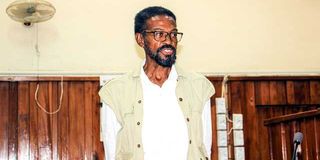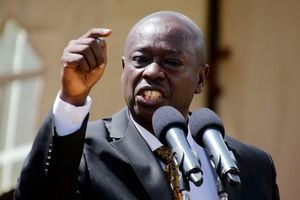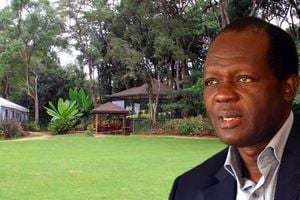African-American wants court to grant him Kenyan citizenship by ancestry

Mr Mubarak Abdul Muqsit Akram, an African American who is seeking to be recognised as a Kenyan citizen, at the Mombasa High Court on Wednesday last week.
What you need to know:
- Mr Akram says that Kenya is closer to the Red Sea where he can cross over and visit holy sites.
- He explained that his parents were African-American and not Caucasian
An African-American who is seeking to be recognised as a Kenyan citizen by ancestry, has claimed that he suffered name-calling when he lived in the US.
While testifying before a Mombasa court, Mr Mubarak Abdul Muqsit Akram said since his childhood and into adulthood while in the US, he and his family were called “coloured people” among other derogatory names.
Mr Akram wants the court to order State authorities to issue him a Kenyan citizenship.
He says he chose to settle in Kenya because he feels it is close to him, adding that Kenyans are good people.
“I have chosen Kenya and not other countries. My choice of Kenya as my ancestral home is informed by the fact that modern-day Kenya was part of the larger African territory from where my descendants were forcibly caught and enslaved to America,” says Mr Akram.
Mr Akram, who was testifying before Justice Olga Sewe, added that Kenya is closer to the Red Sea where he can cross over and visit holy sites.
He explained that his parents were African-American and not Caucasian, as such he believes he has an inalienable right to return to his motherland and ancestral home, which is in Africa.
“I’m gainfully employed and not seeking any compensation from Kenya. I request a Kenyan identity card and passport. I am not a refugee,” Mr Akram told Justice Sewe.
He says that, cognisant of his roots and heritage in the African continent, he visited Kenya briefly for the first time in 2003 and later returned in 2008, and ever since, he has found solace, warmth and comfort albeit as a “foreigner”.
The petitioner is seeking a declaration that under the rules of international law and the Constitution, his right to return to his ancestral home and the choice of Kenya as his country of return is guaranteed and ought to be protected by the State.
National Identity Card
Mr Akram also seeks an order that the Director of Immigration and Citizen Services be directed to within 30 days of the judgment, recognise him as a Kenyan citizen and issue him with a passport and National Identity Card as a right.
The petitioner says he has made several applications for registration as a Kenyan citizen to the Department of Immigration but has never received any response.
Mr Akram says he was born in the state of Texas in 1946 to African-American parents and that since his return to Kenya in 2008, he has established and registered several businesses which he runs from his operating base in Kwale County.
The petitioner, who holds a foreigner certificate, has sued the Cabinet Secretary for Interior, Department of Immigration and Citizen Services Director-General and the Attorney General.
Upon cross-examination by lawyer James Kemei for the AG, Mr Akram told the court that the Immigration Department issued him with a foreign certificate.
Legal and justifiable claim
Assistant Director of Immigration Services Ronnie Akedi, in his replying affidavit, states that the petitioner’s belief and conviction that Kenya is his motherland is misplaced and ill-advised.
“There is no probable justification as to how the petitioner has singled out Kenya, out of 54 African countries, as being the country where his descendants’ origins emanate way before the partition of Africa into modern-day states,” says Mr Akedi, adding that the petitioner’s investing in the country does not in itself present criteria for one to be registered as a citizen.
Mr Akedi says the petition does not disclose any legal and justifiable claim against the respondents and that it ought to be dismissed.
According to the petitioner, his choice of Kenya as his ancestral home is anchored in and informed by the provisions of The Abuja Proclamation — a declaration of the Pan African Conference on reparations for African enslavement, colonisation and neo-colonisation, which was sponsored by the African Union held in Nigeria in April 1993.
The petitioner says that among the provisions of the proclamation was a declaration calling upon all African states “to grant entrance as of right to all persons of African descent and right to obtain residence in those African states if there is no disqualifying element on African claiming the right to return to his ancestral home”.
Hearing resumes on June 12.





